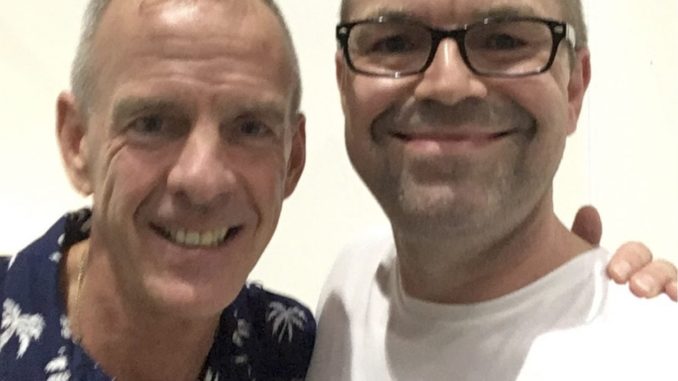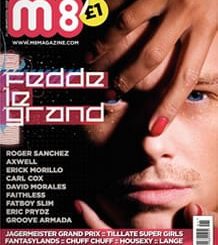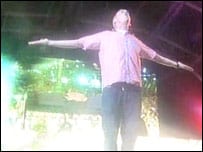5 September, 2017 – by Phil Morse
This weekend I spent some time with Norman Cook, aka Fatboy Slim, just before he played a headline set at the Gibraltar Calling music festival, just across the road from our HQ here in Gibraltar. In this exclusive interview, he shares the secrets of staying relevant for a lifetime of DJing, how he’s managed such a long career personally, his views on the commercialisation of the scene, and some tips for DJs just starting out.
Phil Morse: I’m with Norman Cook backstage here at the Gibraltar Calling festival. Norman is shortly going to hit the stage and turn into Fatboy Slim, the larger-than-life character we’ve grown to know and love over the decades.
Fatboy Slim: You’ve caught me at that stage of the night when tadpoles start growing legs. I’m actually sort of half Norman and half Fatboy, I’m going through my metamorphosis…
Phil Morse: You are! An hour before set time…
Fatboy Slim: Yes. If you’d interviewed me two hours ago, I’d be very, very dull. I’d be a dull father of two…
Phil Morse: So talk to me about the metamorphosis between being a normal bloke with a couple of kids, and then suddenly being onstage, headlining a festival, in front of tens of thousands of people, and being the act they’ve all waited for…
Fatboy Slim: Well, the only way of maintaining that into your fifties is to live a dual life. I kind of lived the life of Fatboy Slim 24 hours a day for about a decade, and it nearly killed me. It’s untenable to try and live like that all the time, and you’re not a responsible citizen, and you shouldn’t be left in control of children.
So I kind of figured that the only way I’d do it was quit drinking, for starters, just to give me a bit more longevity, and also just to separate the onstage person from the offstage persona. You know, I was in my mid-forties before I really started doing that, but it just prolonged my shelf life, because I can go nuts for two hours a day, but then I’m quite reserved for the other 22, and I do actually get things done, and I’m a responsible citizen.

I spoke to Fatboy Slim backstage in his dressing room, an hour before his show.
Phil Morse: So what is it about DJing that means, when people get it right, they can carry on being relevant and carry on being appealing across the generations? Unlike most bands, for instance?
Fatboy Slim: Because it’s a very timeless primeval thing that we do. Basically, bands, it’s about the cult of them and the cult of their stardom or the message they try to bring. DJs, there no real underlying message apart from: “Do you want to come with me and escape? And forget all your troubles and cares and the worries, and let’s just pretend we’re young and sexy and mental and have no responsibilities?”
So basically, we’re selling the soundtrack to irresponsibility, and that’s timeless. It’s like since cavemen first begun dancing drunkenly round a campfire, there’s been a sort of desire to escape and flirt and look stupid and jump up and down and dance and all these things, and they’re all tied in.
And it’s mainly young people who do it, or idiots like me, but it’s a very primeval thing, so if a DJ knows how to do that, if you know how to tap into that hedonism and escapism, it’s a timeless thing, you don’t have to keep writing new tunes, you just listen and know which tunes are going to turn people on. You play them to them in the right order, and job’s a good ‘un. But it is definitely the business of selling escapism…
Phil Morse: Well, it’s interesting you say that you just “find the tunes that are turning them on and play them in the right order”, which makes it sound easy. But I’ve seen here this weekend some of the new breed of producer/DJs – and I’m going to call them producer/DJs, rather than DJ/producers – who are basically playing hugely obvious pop records in no particular order, and bigging the crowds up in between on the mic, and that’s basically it…
Fatboy Slim: Yeah.
Phil Morse: Now, that is what you and I escaped from, as a generation, and we thought we could do better than that, and as I say I’ve seen DJs out there this weekend doing only that. So the question I have for you is: Is there room for that kind of thing? Has the scene changed fundamentally somehow?
Fatboy Slim: You know what, there’s always room for them as long as there’s still room for us. If they took it over and killed it, then I would be upset, but that – the commercial side of the dance scene – has a knock-on effect for everybody, even for the most underground sort of techno DJs or minimal DJs. Everybody is feeling the extra income, love, whatever, and it trickles down.
But even if the whole EDM bubble and the commercial bubble burst, the underground people would still be there, because there’s still people who want to go out and escape. More than ever, it’s dividing into two crowds, and they can co-exist in the same environment. Sure, the DJs are doing what to some outsiders might look like the same job, but it’s a different thing.
Phil Morse: So thinking back to when you started, which was, with respect, a long time ago now, same with myself…
Fatboy Slim: Nearly 40 years. Yeah, 40 years!
Phil Morse: Wow. So someone wanting to start now, what are the parallels, and what’s changed?
Fatboy Slim: Well, what’s changed is the way we play it. It’s become a lot easier to access music and to mix it. So it’s not about your DJing skills as in terms of your mixing the records any more. A machine could do that for you. But it’s still about picking the right tunes, and when you’re DJing, it’s about communicating with the audience. That’s all it’s about.
It’s inviting them into your world of nonsense, and them in turn inviting you into their own world of nonsense, and it becomes a reciprocal thing – they make me feel stupid, and I make them act stupid and that makes me feel stupid – that’s the only thing really you have to remember.
You’re playing the records you love, to them, to turn them on. And it doesn’t matter what software you’re using, or whether you’re playing vinyl or whether you’re good at mixing or not. It’s just about whether you’re communicating with the crowd.
And if, like you said, you were just shouting at the crowd and playing the latest pop hits, that’s one way of doing it. I like to take people on a journey, take them to a tough place but then just hit them with the hook line, a pop record or something, and they’re just like, “Really?” So it’s sort of “thump and wave”. That’s my way of doing it.
But no, whatever your way of doing it, and whatever style of music, and whether you’re sort of moody or underground or leaping around like a loony, it’s all about the love of music and communicating with your crowd so you’re all having the party together. You’re not the big star, and they’re not the punters.
Phil Morse: That’s fantastic to hear. So really, everything’s changed but nothing’s changed?
Fatboy Slim: Yeah! I mean, the way we do it has changed, the amount of people we do it to, thankfully, has changed, and the way we’re treated, and we get dressing rooms and monitors, you know? I mean, when I started DJing, you had to really fight to have a monitor speaker…
Phil Morse: A quick tweak of the record spindle to keep everything in time…
Fatboy Slim: Yeah, yeah. But while those things have changed, the sum of it is timeless. Young people will always want to go out, get high and get laid, so that’s always been the most primeval thing about it. That’s it, that’s 40 years of experience!
Phil Morse: Well, I think that’s a great way to wind this up. Thank you very much for your time, and have a great gig here in Digital DJ Tips’ home country of Gibraltar!
source: www.digitaldjtips.com







Be the first to comment